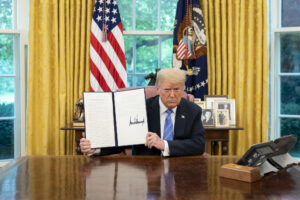I bumped into him at the theatre during the interval, and without saying hello, he said to me: “I’m fed up with your Europe!” Paul and I have known each other since high school. He has never been one for nuance, but here he was really ready to punch the European Parliament member that I am, because “if you are not even able to go and save these people at the Polish border, what are you good for?
Three minutes later, we were the attraction of the buffet, a show within the show, because everyone heard me answer, much too loudly: “Ah yes? Because without the European Union France, Germany or Italy would have sent troops by now, wouldn’t they? We would have already intervened in Poland? Without the Poles having asked us? We would have invaded that country to open its border? Come on! Think for two seconds before you accuse “Europe” of everything and everything else.
This time, I had really pissed him off. “But who is talking to you about invasion,” he retorted. We should parachute in food, tents, blankets, medicines. That’s no big deal, as far as I know! – But no, Paul, not at all: penetrating Belarusian airspace, because I remind you that they are on the Belarusian side, is nothing, nothing but an act of war against a country that has defence agreements with Russia. – There we are! You can do nothing and you will do nothing. The Union is useless and you have just demonstrated that. – Without the Union, Paul, we would not have been able to force Turkey, Syria and the airlines, including the Belarusian national airline, to stop transporting these unfortunate people to the Polish border. Without the EU and the economic power relations it can create, we would have been helpless in the face of this new form of war that Vladimir Putin has launched against us through Lukashenko. Without the Union, the Russian regime would be the dominant force on the continent of Europe, and you would not have liked to live in the shadow of such a dictatorship, I assure you.
I was dying to tell him that I liked his films a lot but that international relations were not his forte. I was looking for a nasty remark, well-turned, very hurtful, but Paul knew how to calm me down in time: “Listen, Bernard: I know it’s complicated, but if Europe hasn’t yet found a way to get these people out of their hell, let’s give up this utopia, let’s stop believing that we’ve made any progress whatsoever since the Liberation, and let’s admit that we’re incapable of defending “European values”, even in Europe, even at home.
Everything got messed up in my head, because what he had just said, I also say to myself when nothing works as well as I would like in the Union, which is three times a day. So often do I share Paul’s rage that I had nothing left to oppose it except the rationality which cannot be heard when unfortunate souls lured by a Lukashenko and fleeing misery are dying of cold and hunger, and us unable to save them without giving in to this provocation.
I would have liked to tell him that, no, European unity was not the remedy for everything, but nevertheless for many things, that the highest degree of social protection in the world from which our countries benefit would have been swept away a long time ago without our unity, and that this unbearable rule of unanimity in foreign policy has the merit of forcing us to find compromises, Byzantine but ultimately effective compromises, since we have been at peace with each other for some seventy years.
I would have liked to add that it would be sheer madness to disunite ourselves at a time when the United States is closing its protective umbrella and moving so far away from Europe, that we must instead strengthen our ties and equip ourselves with a common Defence, that it has become so obvious, even to the Baltics or the Poles, that the taboo of European Defence has now fallen.
I would have liked to continue by telling him that in the face of the challenges posed by the annexation of Crimea and the organisation of this false migratory crisis by Mr Putin and Mr Lukashenko, the unity of the Member States had held together as well as in the face of Brexit and had even been consolidated.
I would have liked to tell him that European unity is a work in progress, necessarily long and difficult, but that the Union brings together independent States that voluntarily share their sovereignty in order to affirm themselves together on the international scene, that this is a first in the history of humanity, that we invent while we walk and that we cannot despair at every failure when we have already built so much.
And then I would have liked to remind Paul that the European Union would already be much more powerful if its 27 countries were not so afraid, governments and voters, of extending the scope of common competences and that he himself… “Paul,” I could only say, “am I right? You did vote ‘no’ to the draft Constitutional Treaty?
He did not deny it. He even ended up nodding when I pointed out that because he had wanted to refuse to “set liberalism in stone”, he had now allowed Poland to treat Lukashenko’s victims as enemies and that one could not at the same time forbid the Union to exist and reproach it for its impotence.
You are right,” he acknowledged, “but a political project cannot carry so many promises and disappoint so many at the same time. If a horizon keeps slipping away, you cannot take it as your direction forever. The bell rang. The interval was over. I was just able to tell him that the nature of horizons was to set a course but never to be reached and the play resumed.



